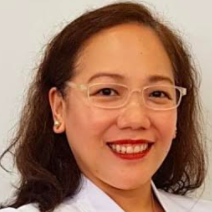

I’m writing this as confirmed cases of the novel coronavirus continue to rise in the Philippines. I’m a doctor, but unlike other frontliners who are staffing hospital triage tents or coping with overwhelming ER consults of possibly infected individuals, I’m doing my share from the relative safety of a primary care clinic located in a mall. (READ: Braving a pandemic: Frontliners battle fear to confront the novel coronavirus)
This is an emotional time for many of us. We’re unsure of just how bad the situation will get, we fear for our loved ones who are vulnerable to the virus, and we doubt if we ourselves are being careful enough so as not to become carriers.
In these uncertain times, one would think that patients will choose to stay home and defer going to a clinic to be seen by a doctor for non-emergency complaints. In the days leading to the Metro Manila lockdown, however, I’ve seen more patients in the clinic. Some come complaining of chronic problems: an intermittent back pain they’ve had for months, lingering insomnia, or a tenacious fungal infection.
Some come for alleged symptoms that have already resolved, and beg for a medical certificate with advice for some days of rest so they can skip work. Those who do consult for mild respiratory symptoms come armed with a list of questions about the virus. They want to know if they have it, and ask if they can be tested.
I tell them that the symptoms of a COVID-19 infection are nonspecific – that is, similar to that of many viral illnesses. That’s not very reassuring, so I proceed to patiently explain that a strict algorithm has to be followed before they can be tested, since testing kits are limited, and reserved for patients with severe symptoms, or those who are more likely to have been infected.
In an attempt to calm their fears, I tell them that I’m not too scared of the virus since it seems to have a high rate of transmission but low mortality. But I also tell them not to underestimate the danger of being infected; that they should stay home as much as possible and observe good hygiene.
My role in these strange times, it seems, is to comfort the ill at ease. I’ve come to realize that the patients’ experience of their perceived illness and how it affects them matter more than the diagnostic tests I will request or the treatment I will prescribe. They need someone to listen to their apprehensions and attend to them fully without any hint of impatience or distraction. Consultation time tends to run longer, but the patients appreciate the effort. (READ: ‘Your service is heroism’: Here’s a big thank you to our Filipino frontliners)
Of course the work isn’t just about being a beacon of calm in a sea of confusion. Sometimes, we get thrown into the confusion as well. In the past week alone, the algorithm for screening for potential PUIs and PUMs changed 5 times. The situation is evolving fast, and we have to keep up with and implement the latest mandates from the DOH.
To be classified as a Person Under Investigation, one needs to have acute respiratory symptoms or diarrhea, plus a history of travel to a foreign country with local transmission. I understand the relevance of the foreign travel criterion, but it seems moot when there are already confirmed cases of local transmission in the Philippines.
Honestly, it’s stressful to follow a screening protocol that isn’t quite consistent with current developments, but we stick to it so as not to categorize every other person as a PUI and consequently run the risk of saturating hospitals already straining under the weight of increased patient load.
On the one hand, I’m proud of my fellow healthcare workers who continue to do their jobs even if it means putting themselves at risk of getting sick. On the other hand, to be truthful, the idea of being quarantined is also quite appealing to me. (READ: [ANALYSIS] Why Filipinos need to stay at home until June (or even longer))
How wonderful it would be to spend my days in the comfort of home, watching my teenage daughter do her TikTok dances, or playing with my amusing 2-year-old niece. How enjoyable it would be to have leisurely meals, listen to music, read a book, take naps, or cook for the family instead of spending interminable hours at work, attending to patients. But in the end, there will always be a good reason to go back to my post.
I became a doctor to serve others, not myself; to do something meaningful for those who have less and derive fulfilment from my work. The way I respond to this crisis will surely test my competence as a physician, but more importantly, it will reflect the kind of human being I am.
So even as I worry about not protecting myself well enough or who among my family and friends might get sick, I will continue to show up. Even as I worry that the Philippine healthcare system is ill-equipped to handle this state of affairs, I will strive to do my share of the work with as much courage, humility, and compassion as I could muster. – Rappler.com
Ma. Regina Luz Dañguilan-Misa is a graduate of Comparative Literature. She graduated from UERM Memorial Medical Center in 2017 and is currently training as a Family Medicine specialist.